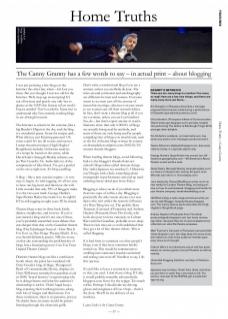I was just perusing a few blogs on the Internet the other day, when – ha! Got you there. Bet you thought I was too old for the Internet. Well, stop age stereotyping! It’s not all twinset and pearls: one only has to glance at the OAP-chic feature in last week’s Grazia entitled ‘You’ve nailed it, Nana-ista’ to understand why I’m currently reading blogs in see-through trousers.
The Internet is eclectic in the extreme, like a big Reader’s Digest in the sky, and the blog is a wonderful genre. Great for recipes and... What did you say? Knitting patterns? Oh come come! It’s not all scones and scarves. I mean theatrical recipes: Hugh Hughes’ Roughbook includes a hilarious analysis of a recipe he found on the street, while David Gale’s Strength Weekly informs you (as Tim Crouch’s The Author fails to) of the components of fake blood. I’ve got a panful on the stove right now. It’s blog-curdling.
A blog – like a new exercise regime – is very easy to begin. As with jogging, it’s all too easy to have one big burst and then lose the will. Little wonder that only 59% of bloggers make it to the two-year mark. George Hunka’s Superfluities Redux has made it to its eighth! If I’m still jogging in eight years I’ll be elated.
Theatre blogs come in three basic kinds: diaries, scrapbooks, and reviews. If you’ve just started a blog and it’s not one of these, you’ve probably unearthed some debate that cuts deeper than that on the Guardian theatre blog (The Edinburgh Festival – How Was It For You? or, Has Fringe Theatre Died?). If so, you should definitely persist. NB: the worry on that site surrounding the proliferation of blogs hits a fascinating nerve: Can You Trust Unpaid Theatre Critics?
Diaristic theatre blogs are like a confession booth where the priest has wandered off. Chris Goode’s king of blogs, Thompson’s Bank of Communicable Desire, displays (as Chris Wilkinson remarked on guardian.co.uk in 2009) ‘brutal honesty’ in questioning why he is doing theatre and what the audience’s relationship is with it. Third Angel keep a blog exposing their working process, along with lots of images and illustrations. For these confessors, there is no penance, just joy. No doubt there are many would-be-priests listening through the electronic grille.
Don’t write a confessional blog if you are a woman, unless you are Belle du Jour. The rules around confession and autobiography are different for men and women. Everyone wants to see men cast off the armour of masculine mystique, whereas everyone wants to see women cast off their normal clothes. In fact, don’t write a theatre blog at all if you are a woman, unless you are Lyn Gardner. No, do – but don’t expect anyone to read it. Statistics show that only 0.0004% of blogs are actually being read by anybody, and most of those are only being read by people compiling lists of blogs you should read, such as the list of theatre blogs written by women on dramadaily.wordpress.com/2010/01/10/ women-theatre-bloggers.
When reading theatre blogs, avoid following links to the blogger’s friends-from-artschool’s blogs (often called obscure things like ‘order Japanese sea monkeys’). Otherwise you’ll begin with a little something about transgender in performance and end up mailordering freeze-dried pets from Tokyo.
Blogging is what you do if you drink more than two cups of coffee a day. Blogging is practically the only reason anyone ever sees dawn who isn’t under the narcotic influence of a West Wing box set. The prolific Matt Trueman (Carousel of Fantasies) and Andrew Haydon (Postcards From The Gods), who both also post reviews variously on Culture Wars and the Guardian, probably never sleep. Their review sites are so well established that they get a lot of free theatre tickets. This is called blagging.
It is bad form to comment on other people’s blogs, even if they have comment facility turned on. This would be tantamount to strolling into someone’s boudoir uninvited and taking your coat off. Needless to say, I do this anyway.
If you’d like to leave a comment in response to this, you can’t. I don’t have a blog. If I did, it would probbly resamlbe advancedstyle. blogspot.com. Sorry for the typign. Too much coffee. Perhaps I should take my driving gloves and sunglasses off too. Oops – there’s the door. That’ll be my delivery of sea monkeys.
Granny’s Netwatch
There are too many blogs to mention! Too many to read! Here are a few nice things, and there are many many more out there…
Ant Hampton or Rotazaza describes a marriage proposal that someone made during a performance of Etiquette (guessbook.posterous.com)
Chris Goode’s (Thompson’s Bank of Communicable Desire beescope.blogspot.com) provides insights into performing The Author at Edinburgh Fringe 2010, amongst other delights.
Tim Etchells’s notebook, on timetchells.com, has some very poetic error messages posted around it.
Tassos Stevens’s allplayall.blogspot.com, discusses notions of play, in a typically playful way.
George Hunka’s Superfluities has moved, but still hosted at georgehunka.com – 95 Sentences About Theatre is well worth a read.
David Gale’s Strength Weekly (strengthweekly.com) is a haven of idiosyncratic writing. So good, even Miranda July links to it. (mirandajuly.com)
Less abstractly, Sinead MacManus writes much on new media for London Theatre Blog, including articles on how to use facebook, blogging and twitter for your theatre company: londontheatreblog.co.uk
HoiPolloi’s blog is quite mega and shows what you can do with Blogger: hoipolloitheatre.blogspot. com. The Canny Granny particularly likes the Hugh Hughes’s Rough Book page.
Andrew Haydon’s Postcards From The Gods (postcardsgods.blogspot.com) has lovely reviews, says Gran, because they are not just evaluations but reflections on what the theatre proposes.
Matt Trueman’s Carousel of Fantasies (carouseloffantasies.blogspot.com) also digs deep into every show, and makes you wish every audience member gave every show such thought.
Culture Wars is at culturewars.org.uk and has great essays on various genres (not just theatre) as well as reviews.
Unverified blogging statistics courtesy of thefuturebuzz.com
Japanese sea monkeys. Order them dried, and when you put them in water they come back to life. For serious. Just wait till the RSPCA get a loada that! logi-net.org

